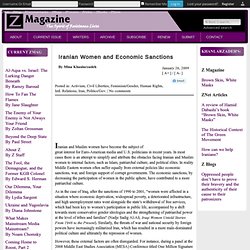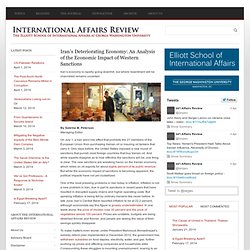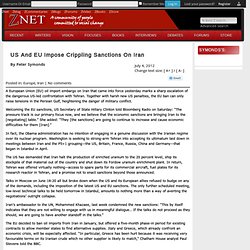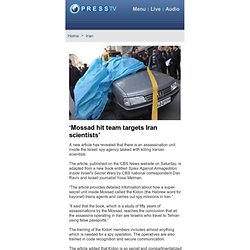

Iranian Women and Economic Sanctions by Mina Khanlarzadeh. Iranian and Muslim women have become the subject of great interest for Euro-American media and U.S. politicians in recent years.

In most cases there is an attempt to simplify and attribute the obstacles facing Iranian and Muslim women to internal factors, such as Islam, patriarchal culture, and political elites. In reality Middle Eastern women often suffer equally from external policies like economic sanctions, war, and foreign support of corrupt governments. The economic sanctions, by decreasing the participation of women in the public sphere, have contributed to a more patriarchal culture.
However, these external factors are often disregarded. Contrary to this claim, I believe the threat of war and the economic sanctions are prominent obstacles that Iranian women must overcome in order to change discriminatory laws in both public and private spheres. The anti-imperialism discourse goes beyond women’s dress and includes many other symbols and concepts considered "western.
" Iranian Women’s Rights Activists Say No to War On March 8. Change for Equality: War does not happen in the course of a day. There is no need for war to land in our cities with a bomb. The shadow of war is also frightening. The possibility of war too changes the lives of women. Every day that we spend at war or in conditions of war, is filled with the fear of the death of the our achievements, which have come about through years of struggle.
War for us, means destructive violence committed against women and children. War is not just bombs and the destruction of our homes. We do not want to become the silent victims of this monster. Videos with English subtitles: Iran’s Deteriorating Economy: An Analysis of the Economic Impact of Western Sanctions. On July 1, a ban went into effect that prohibits the 27 members of the European Union from purchasing Iranian oil or insuring oil tankers that carry it.

Only days before, the United States imposed a new round of sanctions that punish most foreign countries that buy Iranian oil. And while experts disagree as to how effective the sanctions will be, one thing is clear. The new sanctions are wreaking havoc on the Iranian economy, which relies on oil exports for about eighty percent of its public revenue. But while the economic impact of sanctions is becoming apparent, the political impacts have not yet crystallized.
One of the most pressing problems in Iran today is inflation. To make matters even worse, under President Mahmoud Ahmadinejad’s subsidy reform plan implemented in December 2010, the government has withdrawn subsidies on food staples, electricity, water, and gas, further pushing up prices and affecting companies and households alike. Photo courtesy of zerega via Flickr. US And EU Impose Crippling Sanctions On Iran by Peter Symonds. A European Union (EU) oil import embargo on Iran that came into force yesterday marks a sharp escalation of the dangerous US-led confrontation with Tehran.

Together with harsh new US penalties, the EU ban can only raise tensions in the Persian Gulf, heightening the danger of military conflict. Welcoming the EU sanctions, US Secretary of State Hillary Clinton told Bloomberg Radio on Saturday: “The pressure track is our primary focus now, and we believe that the economic sanctions are bringing Iran to the [negotiating] table.” She added: “They [the sanctions] are going to continue to increase and cause economic difficulties for them [Iran].” In fact, the Obama administration has no intention of engaging in a genuine discussion with the Iranian regime over its nuclear program.
Washington is seeking to strong-arm Tehran into accepting its ultimatum laid down in meetings between Iran and the P5+1 grouping—the US, Britain, France, Russia, China and Germany—that began in Istanbul in April. Detail. A new article has revealed that there is an assassination unit inside the Israeli spy agency tasked with killing Iranian scientists.

The article, published on the CBS News website on Saturday, is adapted from a new book entitled Spies Against Armageddon: Inside Israel's Secret Wars by CBS national correspondent Dan Raviv and Israeli journalist Yossi Melman. The article provides detailed information about how a super-secret unit inside Mossad called the Kidon (the Hebrew word for bayonet) trains agents and carries out spy missions in Iran. It said that the book, which is a study of fifty years of assassinations by the Mossad, reaches the conclusion that all the assassins operating in Iran are Israelis who travel to Tehran using false passports.
The training of the Kidon members includes almost anything which is needed for a spy operation. The operatives are also trained in code recognition and secure communication. On July 23, 2011, gunmen killed Rezaeinejad outside his house in Tehran. False pretenses. President George W. Bush and seven of his administration's top officials, including Vice President Dick Cheney, National Security Adviser Condoleezza Rice, and Defense Secretary Donald Rumsfeld, made at least 935 false statements in the two years following September 11, 2001, about the national security threat posed by Saddam Hussein's Iraq. Nearly five years after the U.S. invasion of Iraq, an exhaustive examination of the record shows that the statements were part of an orchestrated campaign that effectively galvanized public opinion and, in the process, led the nation to war under decidedly false pretenses.
It is now beyond dispute that Iraq did not possess any weapons of mass destruction or have meaningful ties to Al Qaeda.